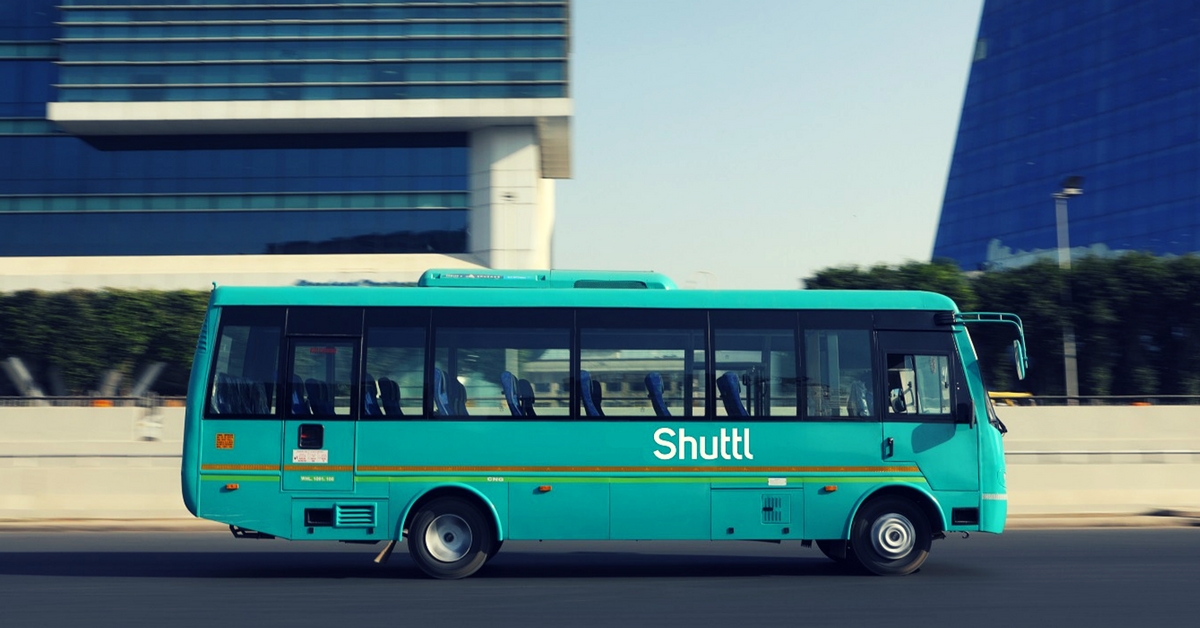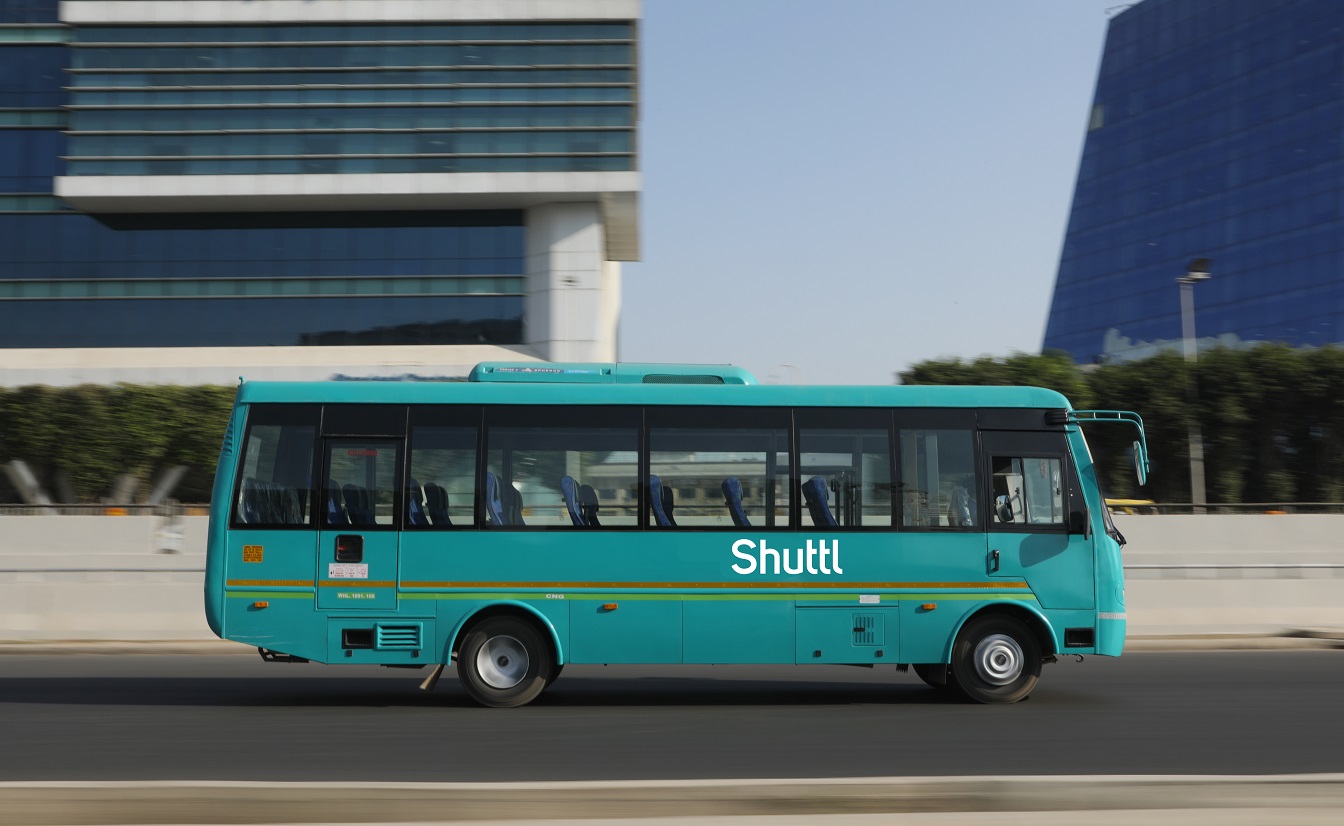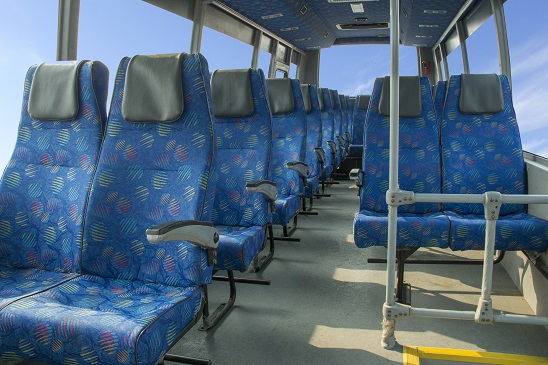Meet the IITians Who Are Motivating Delhiites to Leave Their Cars Home
Commuters using private vehicles spent an average of 3.43 hours each day on the road during peak hours.

The World Health Organisation (WHO) report on the World’s 20 Most Polluted Cities in 2014, crowned Delhi at number one. Although the capital city managed to get rid of the tag and come down to number 11 in 2016, the congestion and air pollution continues to be a jarring concern.
In a city where commuters using private vehicles spent an average of 3.43 hours each day on the road during peak hours, an innovative startup by two IITians is helping Delhiites leave their cars at home.
The Beginning

It all started in March 2014, at e-commerce company Jabong, where both Amit Singh and Shuttl co-founder Deepanshu Malviya worked back then. Both were graduates from the esteemed Indian Institute of Technology, Delhi and Kanpur respectively.
“Different people are driven by different objectives in life. Some by power, some by money, some by fame. How I look at things is, everything else follows. But first, you have to do something unique and something big. I landed a high paying job too early in life. That’s when I questioned, money will always be there, but am I creating an impact? And that thought made me look at money very differently. Three years into my job, I knew it was not going to keep me excited in the long run and I had to do something big. Everything else would follow, and even if it doesn’t, it didn’t matter,” shares Amit Singh.
After an unsuccessful stint in mobile content, they moved on to intercity transport, which did not take off very well.
“One of the prime reason was, we were trying to build a business and not even solving a problem. We were aiming for first world problems and Maslow’s uppermost need rather than catering to the basic needs of a poor countries like ours. The issues here still revolved around housing, sanitation, education and transport.”
Singh attributes his knowledge of the technology and internet space and consumer psychology to his stint at Jabong. “In two years, I could look at things from a very operational and consumer level,” he says.
The big idea came about when both Singh and Malviya decided to join the transport business. “I knew whatever I was doing had to be technology, internet and consumer driven. And most importantly solving a problem. We started off with intercity cabs. Volvos were doing well, but there was lack of connectivity. We thought the issue of commute within the city were solved by biggies like Ola and Uber.” It took only time for realisation to dawn upon them, that the transport and commute was still a bigger struggle for most Delhiites.
Read more: This Startup Is Helping Indian Farmers Turn Agriculture into a Sustainable & Profitable Business
The purpose behind Shuttl
“Uber had beautifully solved commuting problems, but only for rich people. There was nothing that could solve commuting problems of people who couldn’t afford an Uber or any other cool cab services. And the divide between these two sections of people was getting bigger and bigger,” says Singh.
Singh highlights the problem saying, “In most cities, commute is either overpriced or overcrowded. You have to pick one of the two. Why can’t an alternative be fair priced and less crowded at the same time?”
“What is the fundamental thing that drives a commuter’s experience? It is not a car. Though we confuse it with a car or a cab, but what we need is just ‘one seat.’ We don’t need a seat more or a seat less. Unfortunately, there is no product in this world which guarantees you one seat, not a seat more, not a seat less. When you book a cab, you may sit on one seat, but you are paying for four other seats too. Ironically in public transport, there is no concept of a seat at all!” he adds.
Singh thinks the commute people undertake must be comfortable enough to keep pace with the rest of their lives. “You don’t expect to walk into a theatre and stand and watch a movie. Even if an hour and a half long. But over the years, we have come to accept that we can stand and commute! Why should we? Standing takes away that time from us,” he says.
“This makes commute the worst part of the day for us. Over the years our movie theatres, our workplaces, even our housing has become better but our commute is still the same. This is keeping in mind the larger population that cannot afford fleet and cool cabs,” he adds.
But how is the idea affecting the environment?

Shuttl began in April 2015. It operates hired mini-buses on its platform that can seat between 20 and 40 people. It targets those who travel to work nearly 20 times a month, mostly in their own cars. In that case, if 40 people use the bus regularly, those many vehicles are likely to go off the road.
“If people start moving away from cars and cabs, we are actually removing the number of cars that are plying on the roads. It is opening other opportunities for travellers who can use their commuting time in a more fruitful manner. When your commute is better, you are motivated to achieve more. It will also reduce congestion and pollution and at the same time avoid wastage, as a cost efficient option.”
You may also like: 12,000 Vendors to Have India’s First Bharat QR Code Enabled Devices, Thanks to One Startup
The Art of Right Commerce vs Philanthropy
Was tackling an environmental problem the underlying aim? Singh says, “It is all rooted in one thing. I cannot say, it was the sole purpose behind why it all began. A business cannot exist without a consumer and a consumer cannot exist without a need. I personally think commerce can solve a lot more problems than just philanthropy. What is needed is ‘right commerce.’ Solving a need in the right way will affect change in the right direction, because then there is a very strong momentum that builds around it.”
He gives a simple analogy, “If we are just going to tell people to leave their cars at home, it will never affect change. So here I was proposing, ‘Yes, I will make your commute better and at the same time help the city become greener and decongestant.’ And that worked. What was needed was a credible alternative.”
“If being conscious about my environment means people have to be stranded on the roads, and be packed in buses and go through that grill every day, then they won’t be interested in saving the environment. That’s one of the reasons why we have so any cars plying on the road in the first place. We can push this transition only when we offer credible options. And that alternative must be rooted in their prime need. What we are essentially talking about here is not a small move, but a big compromise. Who wants to leave their two cars and drivers at home when they have that kind of luxury?” he questions.
The road ahead

Shuttl currently runs 450 air-conditioned buses along 75 routes connecting areas across Delhi. It offers a staggering 20,000 rides a day from 300 pick-up points. Passengers book seats on the company’s app, paying between Rs 50 to Rs 80 for each ride, in addition to daily and monthly plans.
Talking about surviving competition Singh says, “We don’t track competition, we don’t hire from competition, we are completely ignorant of competition. Which hurts us at some point, but also helps us stay on the right track, which is trying to solve the problem of commute.”
Ending the conversation on a hopeful note about the road ahead, Singh says, “We are in the early stage. We are still trying to see what works and what doesn’t. We are exploring how to ensure reliability, on time performance and how to solve the complex problem of commute. Our ticket prizes are smaller. There’s a lot of people to cater too, which of course is our intention. But, we need to be a lot more operationally strong. We are more focused on building ourselves.”
Connect to Shuttl here.
Like this story? Or have something to share?
Write to us: [email protected]
Connect with us on Facebook and Twitter.
NEW: Click here to get positive news on WhatsApp!
This story made me
- 97
- 121
- 89
- 167
Tell Us More
We bring stories straight from the heart of India, to inspire millions and create a wave of impact. Our positive movement is growing bigger everyday, and we would love for you to join it.
Please contribute whatever you can, every little penny helps our team in bringing you more stories that support dreams and spread hope.



















